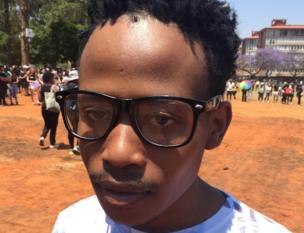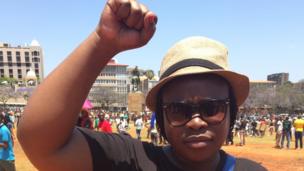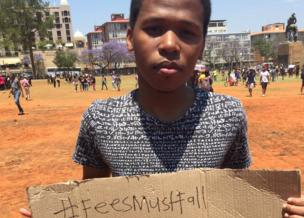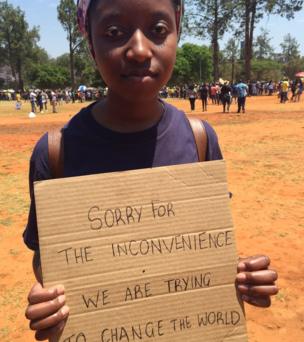Some of the students in South Africa who have been participating in the nationwide protests over tuition fees talks about their struggles to get an education below are their stories:
Thembile Lesane, 23

I'm from a small town in the North West Province and am the very first person in my family to go to university - I'm under a lot of pressure to succeed.
If I have to drop out of school because I couldn't not afford the fees, it will be big disappointment to everyone.
It's unfair to have to struggle just to get an education in this country and yet we are told it's the most developed country in Africa.
Degrees in South Africa:
- Most undergraduate degrees (without honours) take three years
- Another year for a post-graduate honours degree (generally required to do a master's)
- A master's degree would be another two years
I'm sitting with student debt of close to 100,000 rand ($7,328; £4,774) to repay as soon as I start working.
I'm from a family where my father is the sole bread winner, he works as a cleaner at a lodge - he makes very little money.
My family support what we are doing here, they know that we are not just doing this for ourselves but for our children.
I want to study towards a post-graduate degree next year but I won't be able to because the National Student Financial Aid System (NSFAS) doesn't fund the degree I need to do.
I hope I can find a job next year and save enough money to return to school in 2017.
I don't think our government knows how hard it is for us from poor families to get educated.
It was a proud moment for my whole family when I qualified for university but our joy has been short-lived. Its bitter-sweet because now this education is a burden.
Ntokazi Nkushubana, 21

My mother is paying for my fees and the rest covered by NSFAS. It's a real struggle for her.
Making tertiary education so difficult to acquire is a big problem - especially when it's being done by the [governing] African National Congress (ANC) which has been promising us free education since 1994.
Tertiary education is now a privilege or for the rich in this country and it shouldn't be like that, anyone who is academically deserving should be able to further their studies if they want to.
I cannot afford university fees and if they were to go up then I won't be able to do a post-graduate degree and many places don't hire you unless you have a post-graduate degree - we have many unemployed people sitting at home with undergraduate degrees - the entire system is flawed.
I don't know why this government wants to keep us uneducated at this rate we will continue having unskilled labour.
They are now doing to us what the apartheid government did to them - except this is academic exclusion, it is financial exclusion.
My father was in the struggle and didn't finish school, this is not what he fought for. He didn't go through all of that for us to now have a repeat of 1976 [the Soweto uprising when schoolchildren protested about a new policy to teach black children only in Afrikaans].
They are segregating us and its worse because its people who have been through it before and now they are turning around and doing it to their children. Do they care about the country they are going to leave us with when they die? I don't think so.
Makhule Mpedle, 21

The government says there is a skill shortage in the country and yet won't help us get the qualifications we need - I am disappointed in the people running this country.
I don't know how our families are expected to fund our studies if even middle families are struggling.
I'm from Limpopo, my family is considered middle class because both my parents are working and can afford a certain kind of lifestyle. We are not well off though.
My older brother had to drop out of school so my parents could afford to pay for me. He had qualified for a master's degree but had to put his own dreams aside.
My [annual] fees alone are currently 35,000 rand ($2,562, £1,671) that excludes accommodation, transport, food and school supplies - at the end of the year the total is nearly double that.
My sister is planning on coming to university next year and my parents are worried about how they are going to be able to pay for both of us.
We are pleading with the government to reconsider the budget to include students like us, because right now I don't qualify for NSFAS but my parents - who are teachers don't make enough to qualify for the loans we need to study.
Their salaries are enough to pay for our daily expenses and not much else.
It would break my heart if I had to leave school next year because I am so close to graduating but I know that if there is no money at home next year for my sister, I might be forced to.
Many black families are forced to make these difficult choices.
Tawonga Zulu, 20

I've been fortunate enough to get a bursary so that has gotten me through first, second and third year.
I'm graduating at the end of this year but I'm going to study further. My parents will have to come up with a way to pay - they are paying for my sibling too.
My father is an electrical engineer and he runs his own small business.
I do relate to this struggle because If I didn't have a bursary I don't know what I would have done.
I understand the struggle even though I feel like I am more privileged than the average South African so if I am struggling imagine what is it like for the rest of the nation.
Education has become about how rich you are and that's some type of discrimination - that doesn't sit well with me.
All of this boils down to finance and corruption, we need this addressed. I think the government is too comfortable at the moment and they need to be shaken up a bit.
For me this goes beyond a protest about fees, there are bigger issues that need to be addressed such as inequality.
For example the middle class measure is not the same here for black and white people, I was born middle class but my family weren't but a white child my age is most likely to be from generations of that - that needs to change. We all need to have equal opportunities.
No comments:
Post a Comment